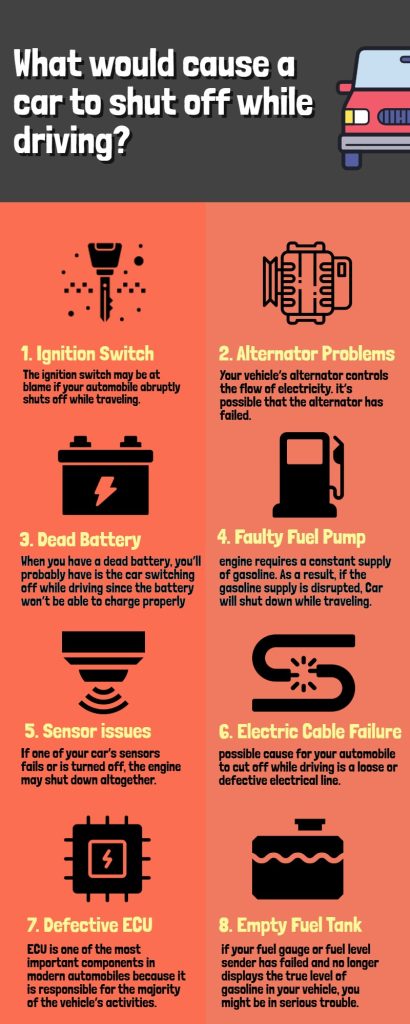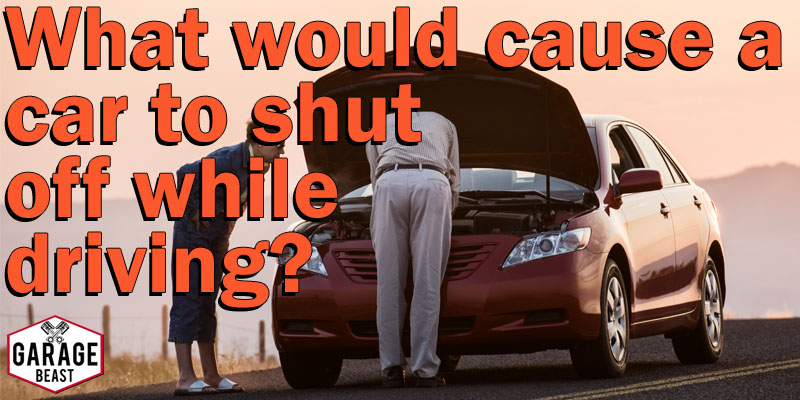Please note that this post may contain affiliate links and any sales made through such links will reward me a small commission – at no extra cost for you..
If your car has suddenly stopped You might have thought What would cause a car to shut off while driving? because nothing makes your heart race like your automobile abruptly shutting off in the middle of traffic. It is your responsibility to maintain an automobile when you own one.
Many auto owners seem to believe that their vehicle is powered by magic dust. To ensure that your automobile stays in good working order for a long time, you must check the oil, gas, coolant, and other fluids on a regular basis.
Knowing the basics about your automobile might help you deal with technical issues like your car switching off while you’re driving.
In this post, we’ll explain why your car could shut off while driving, so you’ll be prepared the next time it happens.

Table of Contents
#1 Problems with ignition Switch
The ignition switch may be at blame if your automobile abruptly shuts off while traveling. When the ignition switch becomes frayed, vibrations, such as striking a circular section of roadway, cause your engine to lose power.
Your car’s engine dies unexpectedly while traveling on the road due to a loss of power. The ignition switch is located behind the ignition lock and is activated when the key is turned to start the vehicle.
Small metal plates on the inside of this switch can corrode and rust. If this happens, one of these plates may break contact, resulting in the ignition being turned off & would cause a car to shut off while driving
This will also result in the entire engine shutting down. Fortunately, determining whether or not this is the case is simple.
Check your dashboard for any remaining lights/ignition lights after the car has shut off. If the dashboard instrument isn’t working, there’s a good probability the ignition switch is broken.
#2 Alternator Problems
Your vehicle’s alternator controls the flow of electricity. If your automobile suddenly stops operating, it’s possible that the alternator has failed.
The power supply to essential automotive components will be cut off if the alternator fails, and you may notice the lights in the dash shutting out or the engine unexpectedly losing power.
When the auto alternator malfunctions, it loses its capacity to charge the electrical system, resulting in a power drain. The power may steadily dwindle until you can only keep the car running at idle.
As a result, you may need to charge it before it dies again. Normally, this will result in an unplanned shutdown, leaving you in a difficult driving circumstance.
To guarantee efficient operation and avoid unexpected automobile shutoffs, drivers must keep the battery and alternator connections clean at all times.
Symptoms such as the dashboard warning light turning on, flickering headlights, battery draining faster, and harsher engine running can all indicate a malfunctioning alternator.
You can simply repair or replace the alternator on your own if you know what you’re doing, or have it done for you during normal maintenance because it’s quick and cheap.
#3 Dead Battery
The battery is another important component for vehicle power since it provides the necessary electricity to initiate the combustion process as well as powering other electrical components.
When you have a dead battery, one of the problems you’ll probably have is the car switching off while driving since the battery won’t be able to charge properly, meaning it might run out of power at any point.
However, in many circumstances, if the battery can start the car, it should be able to keep it going as well.
As a result, if anything like a short-circuit occurs while driving, it will usually simply force the car to halt.
#3 Faulty Fuel Pump
The vehicle’s engine requires a constant supply of gasoline in order to propel the vehicle. As a result, if the gasoline supply is disrupted, the automobile will shut down while traveling.
One of the most common problems that might impact the engine’s fuel delivery is a broken fuel pump. As a result, if your fuel pump fails, you’re more prone to encounter engine shutoffs.
Occasionally, the fuel filter, not the fuel pump, is the source of the problem.
However, regardless of the cause of the issue, it must be resolved in order for your car to continue to perform properly.
#4 Malfunctioning Sensors
Many sensors are used in modern automobiles to adjust the air-fuel combination for maximum fuel efficiency. If one of your car’s sensors fails or is turned off, the engine may shut down altogether.
Fortunately, most of these sensors can’t entirely turn off the engine.
Sensors such as the MAF sensor, coolant temperature sensor, and oxygen sensor might muck up the air-fuel mixture to the point that the engine dies.
#5 Electrical Cable Failure
If your battery is in good operating order and other components such as spark plugs and alternators are in good functioning order, another possible cause for your automobile to cut off while driving is a loose or defective electrical line.
The vehicle must not only generate adequate electricity but also deliver it to all of the critical components, which is what the cables are responsible for.
If the cables become loose or damaged while driving, the vehicle’s key parts and components may lose power, resulting in an unexpected engine cut off while driving.
#6 Defective Engine Control Unit
The engine control unit, or simply ECU, is one of the most important components in modern automobiles because it is responsible for the majority of the vehicle’s activities.
The ECU is a little computer that ensures that everything in your car operates well and that any faults are easily identified.
If this automobile computer isn’t operating properly, it might cause the engine to lose power, causing the vehicle to shut down.
When you have an issue with the ECU or other engine or vehicle problems that cause the computer to malfunction, the check engine light will likely turn on.
#7 Empty Fuel Tank
Most automobile owners are aware that they should check their fuel level periodically while driving.
If you have enough gasoline for your trip, that’s great; however, if your fuel gauge or fuel level sender has failed and no longer displays the true level of gasoline in your vehicle, you might be in serious trouble.
Filling 1 gallon (4 liters) of gas and seeing if it starts is a simple technique to test whether there is an issue with your fuel gauge or fuel level sensor.
As a result, checking the gasoline gauge might prevent you from spending hours and hours on the road.
If this happens again, you may need to take your car to a mechanic to have your fuel gauge checked since it may be giving you a misleading reading.
Useful Tips for reducing the likelihood of your car stopping
• Maintain a regular maintenance plan and make sure your car is maintained completely at all times.
• Keep the battery terminals and alternator connections clean and clear of debris at all times.
• When the gasoline warning light turns on, refuel right away.
• Replace your spark plugs on a regular basis.
In a Nutshell :
Cars do not just switch off while driving because there is always an underlying problem, whether it is a malfunctioning fuel pump or alternator, or you have just ran out of gas without realizing it.
Identifying the source is always the first step in dealing with this unpleasant and perhaps deadly condition.
If you’re a seasoned driver, warning indicators of a problem should be obvious, as they’ll appear long before the automobile abruptly shuts down.
Fixing the underlying issue is the best method to deal with the problem after you’ve identified the source, and in many cases, you won’t even need the help of a technician.
Finally, the best method to deal with this issue is to avoid it by doing regular car maintenance and maintaining safe driving behaviors.

